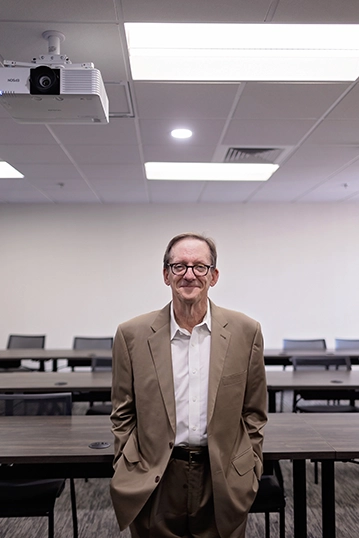Published on November 13, 2025 by Morgan Black

After more than 36 years of dedicated service, professor Mike DeBow retired from Cumberland School of Law in December 2024, closing a chapter that has left a lasting mark on generations of students and colleagues.
Following his graduation from Yale Law School, DeBow began his career in private practice in Washington, D.C., followed by a judicial clerkship with Judge Kenneth W. Starr of the U.S. Court of Appeals for the District of Columbia Circuit from 1983-84. DeBow then served as a legal adviser to Federal Trade Commission chairman James C. Miller III (1984-85) and a special assistant to assistant attorney general Douglas Ginsburg in the Antitrust Division of the U.S. Department of Justice (1985-86).
DeBow began his teaching career at the University of Georgia Terry College of Business, where he taught for two years before coming to Cumberland School of Law in 1988.
“If you do the arithmetic, you will find that I had been a member of this faculty for 36 and one-half years when I retired last December,” he said. “I can’t quite believe it myself.”
Over the decades, DeBow became a cornerstone of the Cumberland community—for his scholarly rigor and teaching, and also his enduring commitment to students and colleagues. “Cumberland has been a wonderful place for me,” he said. “The school’s great strength is its people—students, staff and faculty. I doubt there is a more supportive law school environment anywhere.”
DeBow built his academic career around the legal foundations of the market economy. He taught Business Organizations every year and, since 1994, taught Property. These, along with Contracts, form what he calls “the core of the law of capitalism,” essential to both economic prosperity and legal practice.
“I tried to focus my Business Organizations and Property classes on the business lawyer’s key function,” he explained, “helping clients identify potential problems in advance, negotiating an acceptable solution and drafting the legal documents to implement the solution.” He credits former faculty colleague Tom Stone for many helpful discussions that shaped his approach.
Beyond the core curriculum, DeBow taught a wide range of electives: Administrative Law, the pre-1L summer Legal Process course, Legislation, and Local Government. Including courses in Cumberland’s online compliance program, he estimates he taught at least 184 courses. He also led or co-taught 15 courses in Samford’s Brock School of Business, political science department and honors program.
To mark his retirement, the Cumberland Law Review published two articles by DeBow: “Capitalism for Law Students” and the forthcoming “Public Policy for Law Students.” Each blends teaching notes and handouts from his classes—particularly Property, Business Organizations, Administrative Law and Compliance. “If you had me for any of these courses,” he said, “the articles will sound familiar.”
DeBow expressed deep appreciation for the students he taught over the years. “It has been my great honor to teach Cumberland students,” he said. “It was also a lot of fun.”
Among his fondest memories are landmark cases that sparked lively class discussion: Tulk v. Moxhay and Village of Euclid v. Ambler Realty in Property, Meinhard v. Salmon and Dodge v. Ford Motor Co. in Business Organizations, Florida East Coast Railroad in Administrative Law, and Hunter v. City of Pittsburgh in Local Government.
Honoring his success in the classroom and the broader academic community, DeBow was named the Stephen Everett Wells Professor of Municipal Law at Cumberland in 2018 and was named a fellow of the Manuel H. Johnson Center for Political Economy at Troy University in 2021.
Though now retired, DeBow remains eager to hear from former students and welcomes updates on their lives and careers.
As Cumberland School of Law celebrates DeBow’s remarkable career, his legacy continues in the thousands of students he taught—and in the solid legal foundation he helped them build.
This story originally appeared in the 2025 issue of Cumberland Lawyer magazine.
Located in the Homewood suburb of Birmingham, Alabama, Samford is a leading Christian university offering undergraduate programs grounded in the liberal arts with an array of nationally recognized graduate and professional schools. Founded in 1841, Samford enrolls 6,324 students from 44 states, Puerto Rico and 16 countries in its 10 academic schools: arts, arts and sciences, business, divinity, education, health professions, law, nursing, pharmacy and public health. Samford is widely recognized as having one of the most beautiful campuses in America, featuring rolling hills, meticulously maintained grounds and Georgian-Colonial architecture. Samford fields 17 athletic teams that compete in the tradition-rich Southern Conference and boasts one of the highest scores in the nation for its 97% Graduation Success Rate among all NCAA Division I schools.
